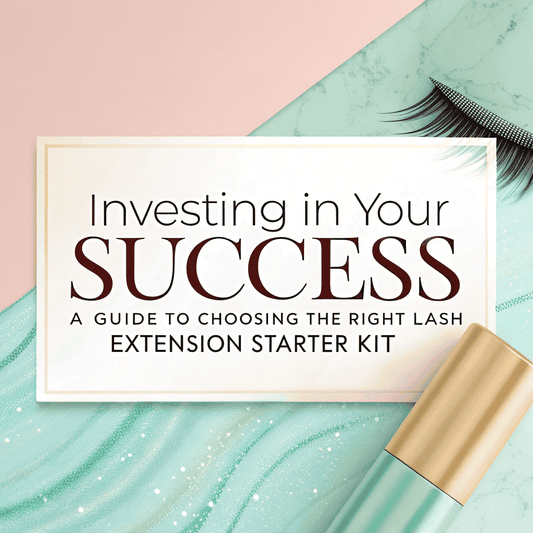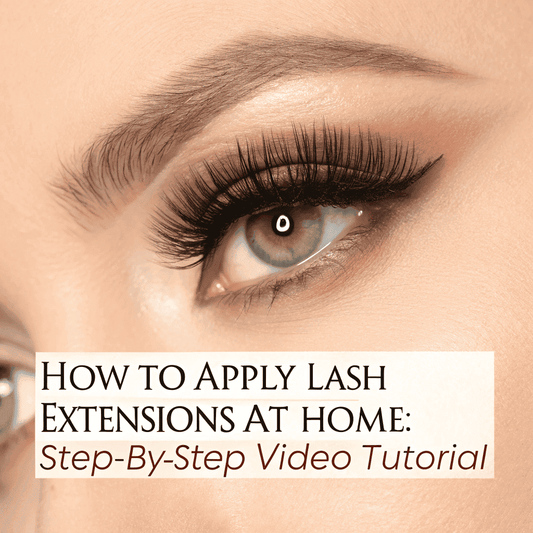Latex vs. Latex-Free Lash Extension Glue: Which Is Better?
Are you on a quest for the perfect lash extension glue? You’re not alone! Many beauty enthusiasts are increasingly seeking out latex-free formulas for sensitive skin or better performance. But the question remains— is latex-free lash extension glue the best choice? We’re here to help you navigate this beauty conundrum.
"Finding the right lash extension glue can make or break your beauty routine. It's not just about looking fabulous; it's also about ensuring comfort and safety for your eyes.”
In this article, we will explore the benefits of latex-free lash extension glue, compare it with traditional options, and help you decide whether it’s the best fit for your needs. Stay tuned as we dive into the details, breaking down everything you need to know to make an informed decision!

Lash Extension Glue: A Detailed Overview
Lash extension glue is key to making your extensions stay put. It forms a bond between your natural lash and the extension. But not all lash glues are the same. Different glues suit different needs.
Many traditional lash glues have latex, which gives a strong hold but can cause allergies for some people. Knowing your options helps you choose a glue that is both beautiful and safe.
Cyanoacrylate is a common ingredient in lash glues. It makes the glue stick well, so your extensions stay in place. Still, many people look for latex-free options due to allergies or sensitivities.
Let’s look closer at what’s inside latex-free lash glues and why they might be the best for you. Whether you have sensitive skin or prefer hypoallergenic products, there's a latex-free glue for your needs.
What are the common ingredients in latex-free lash extension glue?
Latex-free lash extension glue usually relies on cyanoacrylate as its main adhesive ingredient. Cyanoacrylate is celebrated for its quick-drying properties and strong bond, making it ideal for securing lash extensions efficiently.
Another key component is carbon black, which gives the glue its dark color. This ingredient helps the adhesive blend naturally with your lashes, ensuring a seamless and natural look.
For extra flexibility and durability, some latex-free glues include polymethyl methacrylate (PMMA). This ingredient ensures that your extensions stay firmly in place for longer periods.
Hydroquinone is sometimes incorporated to maintain the glue's consistency and extend its shelf life, ensuring that it remains effective over time.
Lastly, ethyl alcohol may be present in some formulas to help mix the ingredients evenly, facilitating a smoother application and more consistent results.

How does latex-free glue compare to latex-based in terms of durability?
Latex-free lash extension glue is a great option for people with latex allergies or sensitivities. It helps prevent allergic reactions, making it safer for more clients. However, it might not be as flexible as latex-based glue, which can affect how long it lasts.
Latex-based lash extension glue is known for its strength and flexibility. The elasticity of latex helps the glue move with natural lashes, making the extensions last longer. This flexibility helps the extensions endure daily activities better than some latex-free options.
The main difference in durability between latex-free and latex-based glues is their makeup. Latex-based glues have natural rubber latex, giving them a strong bond and flexibility. Latex-free glues use synthetic materials that might not be as flexible, which can mean shorter-lasting extensions.
Factors like humidity and temperature can also impact how both types of glue perform:
- Latex-based glues usually handle different conditions better, keeping their strength and flexibility.
- Latex-free glues can still work well but might need more careful application and care to stay strong.
In short, latex-free lash extension glue is good for those with latex allergies or sensitivities, but it might not last as long as latex-based glue. The choice between them depends on your needs, including latex sensitivity and how long you want the lash extensions to last.
What are the potential allergic reactions to latex in lash glue?
Latex comes from the sap of rubber trees and contains proteins that can cause allergic reactions in some people. When used in lash extension glue, latex can cause different allergic reactions, from mild to severe.
Common Allergic Reactions to Latex in Lash Glue
Contact Dermatitis
The most common reaction to latex in lash glue is contact dermatitis. This shows up as:
- Redness
- Itching
- Swelling around the eyelid where the glue was applied
The skin might also become dry and flaky, causing discomfort.

Allergic Conjunctivitis
More severe cases can involve allergic conjunctivitis, which is an inflammation of the eye's membrane. Symptoms include:
- Redness
- Itching
- Tearing
- A gritty feeling in the eyes
This can significantly affect comfort and appearance.
Angioedema
Another reaction is angioedema, which causes deeper swelling around the eyes and face, resulting in:
- Puffiness
- A feeling of tightness
This can be very uncomfortable.
Anaphylaxis
In rare but serious cases, latex exposure in lash glue can lead to anaphylaxis, a serious medical emergency:
- Difficulty breathing
- Swelling of the throat and tongue
- Rapid heartbeat
- Low blood pressure
Immediate medical help is needed to treat this condition.
Latex-Free vs. Latex-Based Lash Glue: What Sets Them Apart?
When you choose between latex-free and latex-based lash glue, it helps to know the key differences. Latex-based glues use natural rubber, which makes a strong and flexible bond. However, it can cause allergies. Latex-free glues use other bonding agents like cyanoacrylate, offering a strong hold without causing latex allergies.
Adhesion and Hold: Latex-based glues are known for their strong and flexible bond. They can stretch and move, which is great for active people. But new latex-free glues, like those from Stacy Lash and Yegi Sensitive, now offer strong bonds that are just as good.
Allergy Risk: Latex-free glues are better here. People with latex allergies can have itching, redness, and swelling from latex-based products. Latex-free glues, like those from Stacy Lash, are hypoallergenic and safe for sensitive eyes or skin.
Fumes and Irritation: Another factor is the fumes during application. Latex-based glues can release strong fumes that irritate eyes. Latex-free glues usually produce fewer fumes. Stacy Lash Sensitive is designed to minimize fumes, making it more comfortable for both clients and lash artists.
Drying Time: Drying times can differ too. Latex-free glues usually dry faster, speeding up the process but requiring quick work from the artist. Latex-based glues may dry slower, giving more time for adjustments during application.
In the end, choosing between latex-free and latex-based lash glue depends on your needs and sensitivities. If you or your clients have allergies to latex, latex-free glue is a safer and smarter choice. Today's latex-free formulas offer a strong hold and less irritation, so you don't have to compromise.
Exploring the Benefits of Latex-Free Lash Extension Glue
Choosing latex-free lash extension glue has many perks, especially for those with sensitive skin or allergies. One big benefit is its hypoallergenic nature. It lowers the risk of reactions by removing latex, a common allergen. This can be crucial if you’ve had redness, itching, or swelling with other lash glues.
Safety First: The safety of your eyes and the surrounding skin is another key advantage. Latex-free glues like Universe Beauty Sensitive Glue are gentle on your eyes but still provide a strong bond for long-lasting results. These glues often produce fewer fumes, which is beneficial for both the client and the lash artist during application.
Versatility: Another benefit is that latex-free formulas are versatile. They work well with different skin types, including those prone to reactions or sensitivities. By choosing latex-free glue, you safeguard your lash routine against potential irritations and ensure a smooth experience.
A Win-Win for Lash Artists:
- For lash artists, using latex-free glue can help attract more clients.
- Offering a hypoallergenic option shows you care about your clients' health and safety.
- Clients get beautiful, irritation-free lashes, and you build a reputation for providing inclusive, high-quality services.
Potential Downsides of Choosing Latex-Free Lash Glue
While the benefits of latex-free lash glue are numerous, it's essential to acknowledge that there may be some downsides to consider.
Firstly, one potential drawback can be the adhesive strength. Latex-based glues are renowned for their robust hold, which sometimes means that latex-free options may not be quite as strong. This might lead to a quicker need for touch-ups, depending on your lifestyle and how strenuously you use your lashes.
Secondly, the drying time of latex-free adhesives can be another point of concern. Some users find that these glues take slightly longer to dry compared to their latex counterparts. This requires a steadier hand and additional patience during the application process—an aspect that could be challenging for beginners.
Additionally, there's the learning curve. Switching from a latex-based to a latex-free adhesive might require some adjustment. Finding the right technique and perfecting the application can take time and practice.
Lastly, cost could be a factor. High-quality latex-free lash glues, especially hypoallergenic variations, might be priced higher due to their specialized formulations. It's an investment in safety and comfort, but one that you should be prepared for.
In weighing these considerations, it's important to balance both the upsides and the potential minor inconveniences. The choice ultimately comes down to personal preference and specific use cases.
Common Misconceptions About Latex-Free Lash Glue
When it comes to latex-free lash extension glue, there are several misconceptions that often lead to confusion. Let’s clear the air on a few prevalent myths, so you can make an informed decision for your beauty routine.
Myth #1: Latex-Free Means Completely Hypoallergenic
Many people assume that just because a product is labeled latex-free, it is entirely hypoallergenic. While latex-free lash glue is safer for those with latex allergies, it may still contain other ingredients that could cause reactions. For instance, cyanoacrylate, a common component in most lash adhesives, may still cause irritation for sensitive eyes. Always check for a hypoallergenic label and do a patch test before full application to make sure the glue suits your skin.
Myth #2: Latex-Free Glue Isn’t Strong Enough
Another widespread belief is that latex-free lash extension glue lacks the holding power of its latex-based counterparts. In reality, many latex-free adhesives are designed to provide a long-lasting and strong hold. Brands like Stacy Lash and Yegi offer high-performance, latex-free options that cater specifically to sensitivity without compromising durability.
Myth #3: Latex-Free Adhesives Are Too Expensive
Cost is often cited as a barrier to switching to latex-free lash extension glue. However, the market offers a variety of latex-free options at different price points. While some premium adhesives may be pricier, there are affordable options that do not sacrifice quality. Investing in the right product can also save you from potential medical costs associated with allergic reactions.
Myth #4: Latex-Free Glue Has More Fumes
It’s easy to assume that removing latex from the formula might increase the presence of fumes. However, many latex-free lash extension glues are specifically designed to minimize fumes, making them suitable for people with sensitive eyes or respiratory issues. Products like Stacy Lash Sensitive are made with reduced fume levels, ensuring a more comfortable application.
By debunking these myths, you can better understand the true benefits and considerations of using latex-free lash extension glue, allowing you to choose an adhesive that aligns with your needs and expectations.

Choosing the Right Latex-Free Lash Extension Glue for Your Needs
Choosing the right latex-free lash extension glue is important and can make a big difference in how the lashes look and feel.
Know Your Sensitivity: If you have sensitive eyes or allergies, go for a hypoallergenic glue. Stacy Lash offers a Sensitive glue that's designed to reduce irritation.
Think About the Environment: Consider where you'll be applying and wearing the extensions. Humidity and dryness affect how well the glue works. Make sure to pick a glue that suits your climate.
Check the Ingredients: Look for glues with safe, medical-grade ingredients like cyanoacrylate for a strong hold. Also, keep an eye out for new options, like Stacy Lash's upcoming PMMA-free adhesive, which promises better safety.
Durability: If you wear lash extensions often, choose a glue that lasts a long time. Yegi's Sensitive Eyelash Extension Adhesive is known for its long-lasting hold and is gentle on the eyes.
Read Reviews: Always check what other users say. Trusted brands with good reviews are usually a safe bet for quality and effectiveness.
By considering these points, you can choose the right latex-free lash extension glue that meets your needs and keeps you happy.
Top Brands Offering Latex-Free Lash Extension Glue
When you're on the hunt for the best latex-free lash extension glue, knowing which brands stand out can make all the difference. Here are some of the top names that prioritize safety and deliver stellar results:
Stacy Lash
Stacy Lash is a well-known player in the eyelash extension industry, particularly applauded for their commitment to safety and effectiveness. Their line of latex-free lash glues, including the Stacy Lash Sensitive glue, is designed to cater to clients with sensitive eyes, reducing the risk of irritation while ensuring a strong hold. A standout feature is their upcoming PMMA-free adhesive, reflecting their continuous innovation to meet diverse client needs.
Yegi Beauty
Another brand making waves is Yegi Beauty. Known for their Yegi Sensitive Eyelash Extension Adhesive, this brand focuses on hypoallergenic formulations that minimize fumes, making the application process more comfortable for both the technician and the client. Their sensitive line offers a reliable bond without compromising on the sensitivity needs of clients.
Lash Affair
Lash Affair offers a robust selection of latex-free adhesives tailored for various application needs. Their products are often praised by professionals for their consistency and performance. The brand places a high importance on developing formulas that are both effective and gentle, ensuring clients with latex allergies have a safe lash extension experience.
Forabeli
Forabeli is another notable brand that provides high-quality latex-free lash glues. Their adhesives are designed to offer a strong bond and long-lasting results, making them a favorite among lash technicians. Additionally, Forabeli's products are often formulated to be low-fume, adding another layer of comfort for sensitive eyes.
Universe Beauty Lashes
Universe Beauty Lashes rounds out our list with their array of latex-free options that combine durability with safety. Their formulations are crafted to adhere strongly while being gentle on the eyes, making them an excellent choice for individuals with sensitive skin or latex allergies. Known for their innovative products, Universe Beauty Lashes ensures that every lash extension application feels effortless and secure.
Exploring various brands can help you find the perfect latex-free lash glue that aligns with your specific needs and those of your clients. Ensuring the right choice not only enhances the beauty of lash extensions but also safeguards eye health and comfort.

Frequently Asked Questions About Latex-Free Lash Extension Glue
Is latex-free lash extension glue suitable for sensitive eyes?
Yes, latex-free lash extension glue is often formulated to be gentle and hypoallergenic, making it a great choice for those with sensitive eyes. Brands like Universe Beauty Lashes and Yegi Beauty offer options designed specifically for sensitive users, reducing the risk of irritation.
Does latex-free lash glue provide a strong hold?
Absolutely. Despite being latex-free, many of these glues are formulated to offer a robust and long-lasting hold. For instance, NOON'S UP Eyelash Glue is renowned for its super strong hold and waterproof properties, ensuring your extensions stay in place.
Can I use latex-free lash extension glue if I don’t have a latex allergy?
Definitely. There are no restrictions on who can use latex-free lash glue. In fact, many users prefer it for its low-fume formula and hypoallergenic properties, even if they don’t have a latex allergy.
Are there any specific storage requirements for latex-free lash glue?
Most lash extension glues, including latex-free varieties, should be stored in a cool, dry place, away from direct sunlight. Ensuring the cap is tightly sealed will help maintain its effectiveness and shelf life.
How can I tell if a lash glue is truly latex-free?
Checking the ingredient list is essential. Look for labels that specifically mention “latex-free.” Additionally, trusted brands such as Lash Affair and Forabeli clearly highlight this feature, ensuring you make an informed choice.



